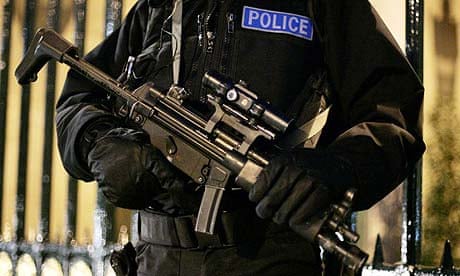Some of Britain's most senior police officers have broken ranks with their colleagues to denounce government plans for detaining terrorism suspects for 42 days without charge, the Guardian can reveal.
As government whips intensify their efforts to avoid a defeat on the plan in the Commons on Wednesday, senior members of the Association of Chief Police Officers (Acpo) have raised doubts about the measure. Their claims will come as a blow to the government, which has highlighted police support for the plans without making any reference to the presence of sceptics in senior ranks.
The Guardian has spoken to four senior police officers who oppose the extra period of detention without charge. Among their concerns were:
Damage to relations with Muslim communities from whom intelligence to counter terrorism is needed
Fears that detectives will face pressure to find, even manufacture evidence, against those held for 42 days
Damage to the police's reputation by becoming involved in such a controversial issue.
One, Rob Beckley, who was the Acpo lead on communities and counter-terrorism from 2002 until last year, went public with his opposition in a speech to a Muslim Safety Forum conference last month.
A DVD of his speech, seen by the Guardian, shows the deputy chief constable of Avon and Somerset telling delegates: "It would be wrong to think that there is a uniform professional view within the police service. I, and I know other chief officers, do not see the necessity of 42 days; we can see the desirability, but at this stage I do not see the professional necessity.
"The issue now, unfortunately, has become very toxic and political, and we are moving away from a rational debate, because of the politics that now envelop this subject, not least of all, the role and position of the government and prime minister and all the other dimensions we read about in the press."
When the Guardian approached him, Beckley said: "I stand by what I said, and continue to have doubts about the investigative need and concerns about the impact on hearts and minds in our work with communities.
"I do feel the debate that surrounded the human fertilisation and embryo bill reflected a mature discussion by the medical professionals involved both for and against it. I'm disappointed that we have not had that sort of debate where we can properly test the assumptions and views, or reflect the different moral positions held by colleagues."
His remarks are likely to be seized on by critics of the 42-day plan who hope to defeat the government when MPs vote on the counter-terrorism bill on Wednesday. All sides admit the vote will be tight - with the government possibly having to rely on the nine Democratic Unionist MPs - prompting Labour whips to warn rebel MPs that they could be responsible for ending Gordon Brown's premiership.
Some senior whips are even said to be telling rebel Labour MPs that defeat for the prime minister on Wednesday could set David Miliband on the way to No 10 by Thursday. Brown wrote to all Labour MPs on Saturday pleading with them to support him, saying: "It is better to prepare for the worst than simply hope for the best."
David Winnick, a prominent Labour rebel, today claimed that although the government appeared to be winning the support of backbenchers last week, opinion was now moving the other way. "The indications now are that things are coming back to where they were," he said.
He also claimed that suggestions that a defeat could lead to Brown being replaced would backfire.
"To talk it up in the way that is being done is counter-productive," Winnick said.
"When Tony Blair didn't get his way with 90 days in November 2005 no-one suggested that the prime minister needed to resign.
"It was decided on the merits, in my view, and it should be the same on Wednesday."
Frank Dobson, the former health secretary who has become a fulcrum for rebels, has a blunt message for MPs thinking of swallowing doubts to support the government. "The last time colleagues did that was over the invasion of Iraq."
Jacqui Smith, the home secretary, insisted yesterday that the 42-day proposal was the right response to the growing sophistication of modern-day terrorism. But she admitted on BBC 1's Andrew Marr Show that MI5 had not requested the change.
Officers who spoke to the Guardian accept their opposition is the minority view at the upper echelons of the service, but they believe the public has been given the misleading impression that all senior officers agree with the government's plans.
One chief constable said he held "moral" reservations about the damaging effect of incarcerating people for up to six weeks without charge, who are then found to be innocent.
Another top officer with extensive experience of serious and complex investigations opposes the plans, saying: "When you start to unpick the hardnose investigative benefits of 42 days, it does not add up."
He said detaining people without sufficient evidence could lead to "speculative arrests where detectives then have to build the evidence, which can lead to 'noble cause corruption'", where officers exaggerate, exclude or invent evidence in order to prove a suspect's guilt.
Another chief constable told the Guardian that even among some officers who support the proposals there is "bemusement" that the government chose to put the issue back on the agenda: "The police service was not overtly asking for this, because it was such a damaging episode last time for the police's reputation over 90 days when we seemed to have been dragged into politics."
